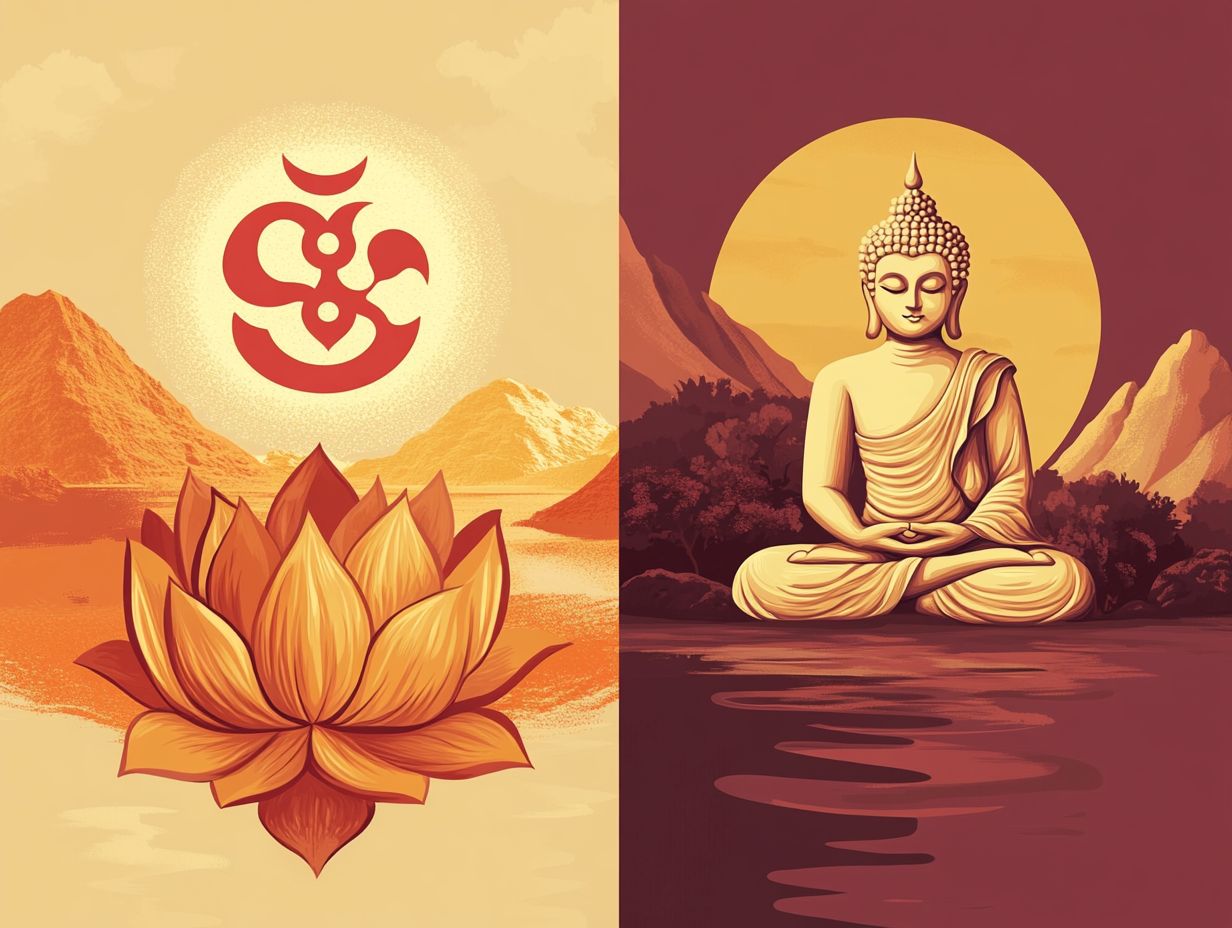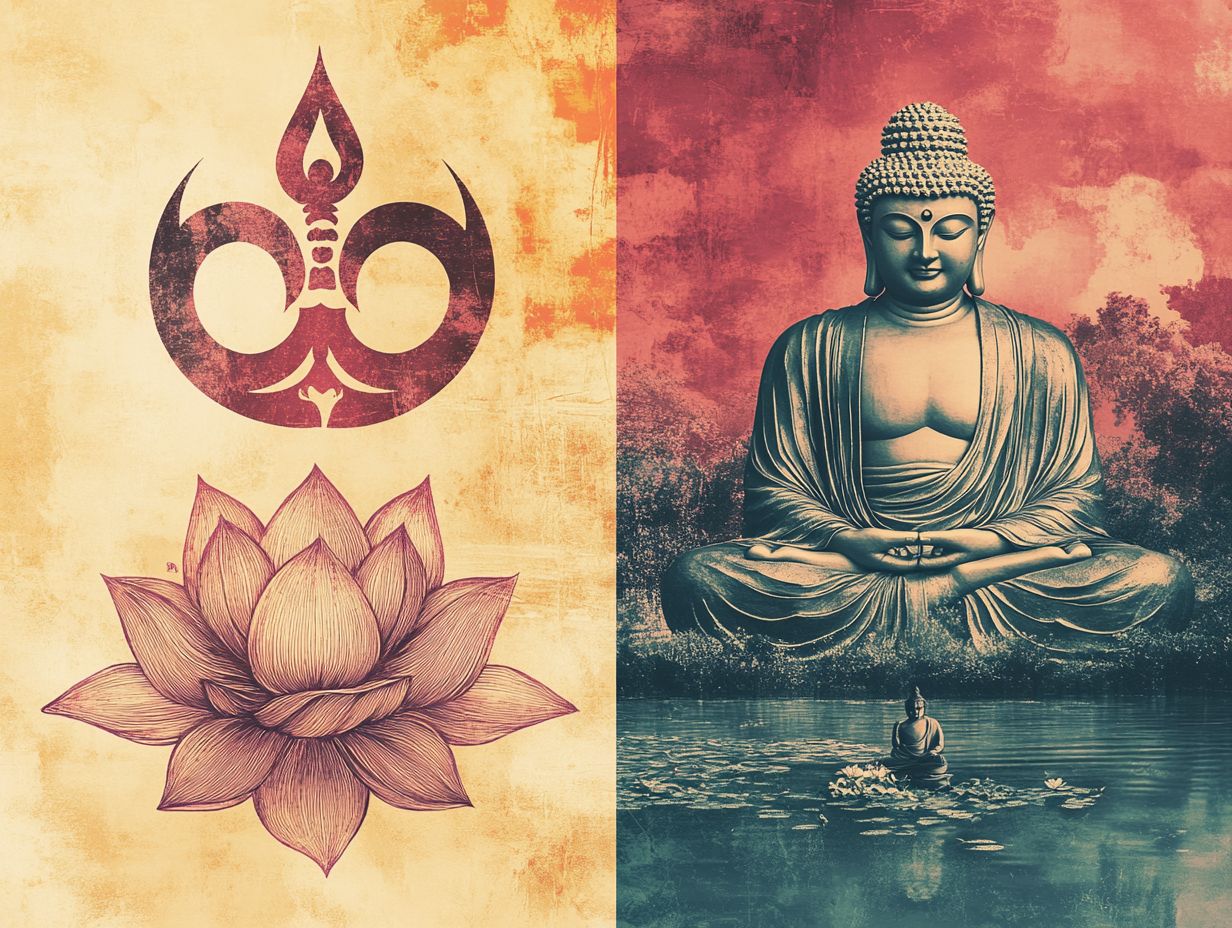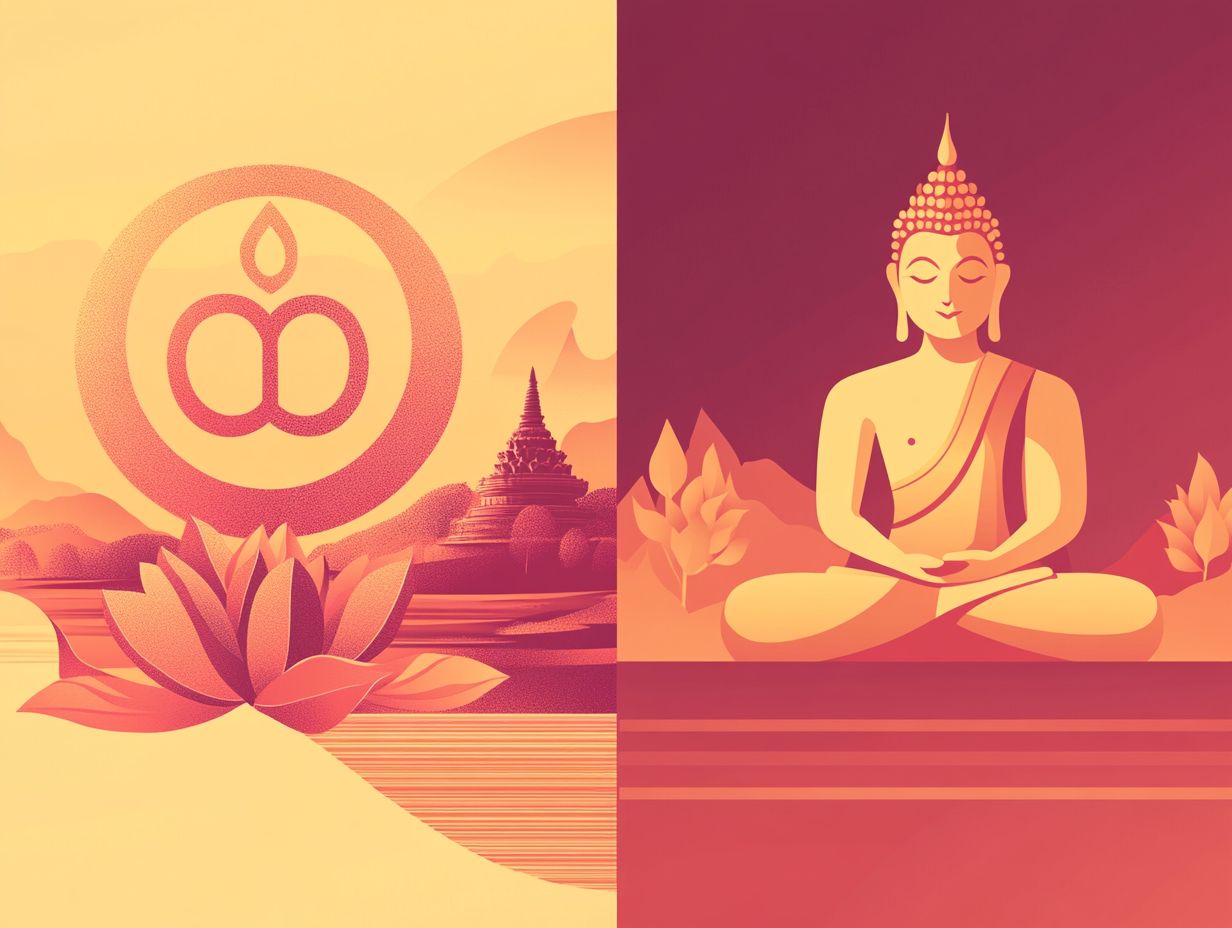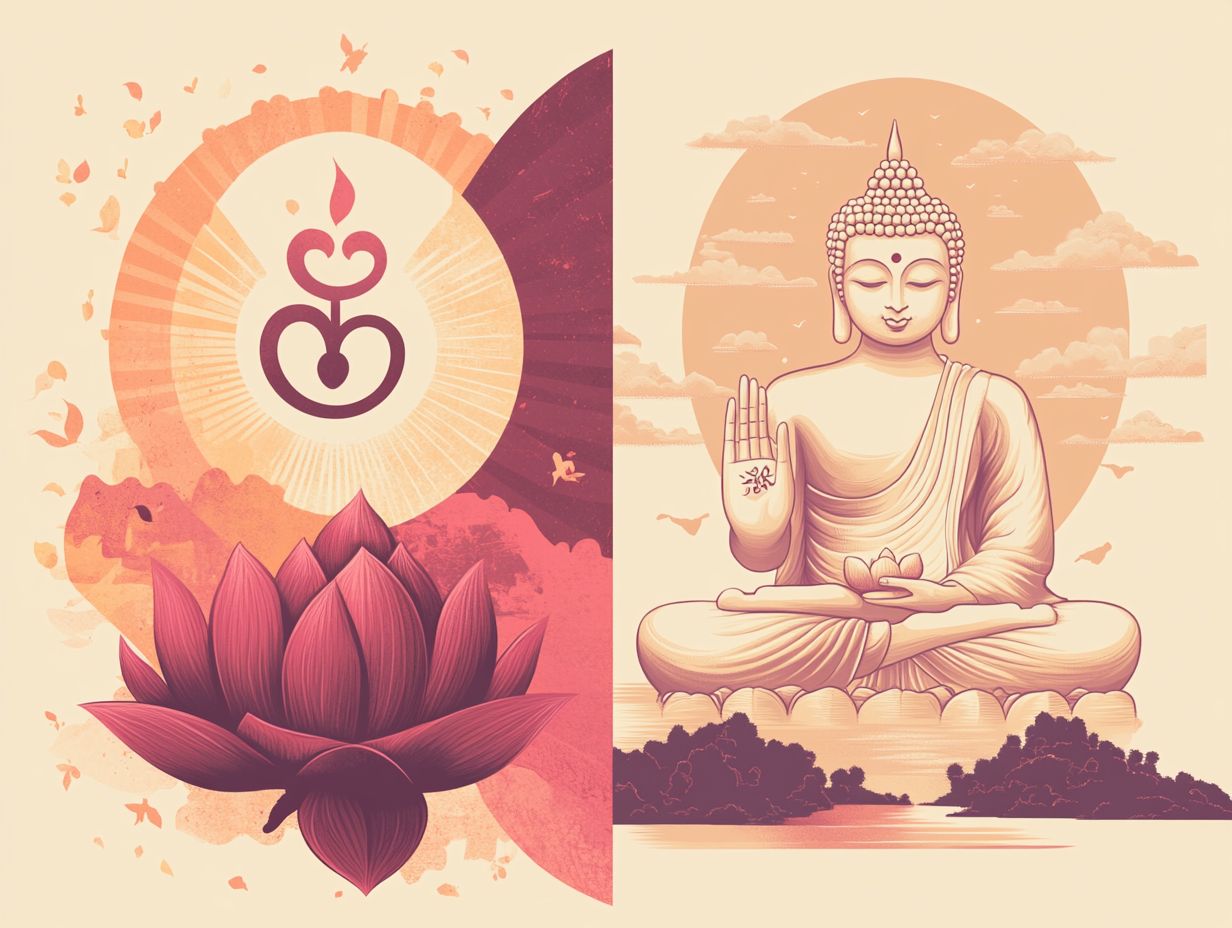What Are Some Similarities and Differences Between Hinduism and Buddhism?
Hinduism and Buddhism, regarded as two of the oldest religions in existence, present a fascinating interplay of beliefs and practices, while also exhibiting notable divergences.
Both traditions highlight essential concepts such as reincarnation, karma, and meditation, reflecting their shared philosophical heritage. However, they diverge significantly in their perspectives on the divine, the nature of the self, and societal structures, including the caste system and social structure.
This article delves into the similarities and differences between these two influential traditions, as well as their profound impact on society. The complexities that define Hinduism and Buddhism will be unraveled, offering insights into their enduring legacies and spiritual philosophies.
Similarities and Differences Between Hinduism and Buddhism

Hinduism and Buddhism, two of the world’s oldest and most influential religions, weave a rich tapestry of similarities that showcase their profound spiritual philosophies. Both traditions highlight the significance of concepts such as karma, dharma, and reincarnation, which intricately shape their respective belief systems and practices. Additionally, the religious texts such as the Vedas and the Sutras provide foundational teachings for Hinduism and Buddhism respectively. To explore the connections between these two religions further, you can read about how Hinduism and Buddhism are similar.
Meditation serves as a crucial element in both religions, acting as a pathway to attain spiritual enlightenment and inner peace. Additionally, the ethical principles of non-violence and compassion are central to their teachings, providing adherents with guidance in their daily lives and interactions with others.
1. Belief in Reincarnation
Both Hinduism and Buddhism share a profound belief in reincarnation, wherein the soul embarks on a cyclical journey of births and deaths, known as samsara, shaped by the actions or karma accrued in previous lives. This cyclical existence underscores the significance of ethical behavior and moral teachings, as every action influences future experiences and circumstances.
In Hinduism, the ultimate aspiration is to attain moksha, or liberation, which signifies a release from this cyclical existence and a reunion with the divine essence. This involves practices such as karma yoga and bhakti. Conversely, Buddhism aspires toward nirvana, a state of enlightenment that allows one to transcend suffering and escape the cycle of rebirth, often through the eightfold path.
For adherents of both faiths, the implications of these beliefs are profound, inspiring individuals to live with heightened awareness and intentionality. This pursuit of good karma is essential for those seeking spiritual liberation, guiding them toward a more mindful and purposeful existence. Followers engage in various rituals and practices to accumulate good karma and progress on their spiritual journeys.
2. Emphasis on Karma
Karma, the intricate law of cause and effect, stands as a foundational concept in both Hinduism and Buddhism, shaping how adherents comprehend their actions, ethics, and moral frameworks.
Within these religious traditions, karma serves as a pivotal guiding principle that influences daily conduct, urging individuals to act with intention and mindfulness. This belief fosters a deep sense of responsibility, whereby one s actions are viewed not as isolated occurrences but as interconnected events that can resonate throughout their existence.
Upholding dharma, or righteousness, becomes paramount, aligning one’s actions with the moral fabric of the universe. The ethical ramifications extend beyond personal outcomes; these principles nurture compassion, humility, and a genuine commitment to the welfare of others.
By adhering to these values, practitioners embark on an ongoing journey of spiritual development, aspiring towards liberation from the incessant cycles of suffering and rebirth.
3. Practice of Meditation
Meditation holds a pivotal role in both Hinduism and Buddhism, providing practitioners with a range of techniques, including mindfulness, zazen, and samadhi, aimed at fostering spiritual growth and enhancing self-awareness. These meditative practices are integral to personal development and achieving states of deep concentration and transcendence.
Each of these methods embodies unique significance and objectives, intricately aligned with the beliefs of their respective traditions. Mindfulness, which has gained considerable traction in contemporary practices, nurtures a profound awareness of the present moment, encouraging individuals to observe their thoughts and sensations without judgment.
Conversely, zazen or seated meditation invites practitioners within the Buddhist tradition to cultivate a state of calm and clarity, facilitating a direct experience of reality. Samadhi, often sought in Hindu meditation, leads to deep states of concentration and bliss, enabling one to transcend the ego and achieve spiritual fulfillment.
Through these diverse techniques, individuals not only enrich their understanding of the self but also uncover pathways to inner peace, emotional well-being, and fulfillment.
4. Importance of Non-Violence

The principle of non-violence (ahimsa) holds paramount significance in both Hindu and Buddhist teachings, underscoring the importance of compassion for all living beings and ethical conduct within personal and societal contexts. This principle is evident in rituals of worship, community service, and daily interactions.
This profound concept transcends simple avoidance of physical harm, infiltrating daily rituals and profoundly shaping interactions among practitioners. Through practices such as meditation and mindful consumption, adherents cultivate an inner landscape of tranquility that profoundly influences their responses to the world around them, promoting religious tolerance and interfaith dialogue.
The ethical teachings associated with non-violence prompt individuals to reflect on the consequences of their actions on others, fostering a culture deeply rooted in kindness and respect. In a contemporary society often overshadowed by conflict, these principles resonate profoundly, serving as a poignant reminder of the essential need for compassion and ethical values in addressing social challenges, ultimately promoting harmony and understanding among diverse communities.
Differences Between Hinduism and Buddhism
Although Hinduism and Buddhism exhibit several similarities, significant distinctions mark the landscape of these two ancient religions. These differences become particularly pronounced in their beliefs regarding a supreme being, their concepts of self, their perspectives on the caste system, and their approaches to rituals and worship.
1. Belief in a Supreme Being
In Hinduism, there exists a profound belief in a supreme being known as Brahman, which embodies the ultimate reality and the source of all existence. This belief system includes elements of monism and pantheism. Conversely, Buddhism typically refutes the concept of a creator god, redirecting its focus towards the pursuit of individual enlightenment.
This fundamental divergence significantly influences how adherents of both faiths approach their spiritual journeys and daily practices. Followers of Hinduism often immerse themselves in rituals of worship and acts of devotion designed to acknowledge and connect with this universal spirit, engaging in various ceremonies that celebrate deities and reflect the divine essence of the cosmos.
In stark contrast, practitioners of Buddhism may elevate meditation and self-reflection as pivotal components of their spiritual paths, aiming for personal insight and liberation from suffering. This often involves ascetic practices and mindfulness techniques. These distinct perspectives on divinity not only shape their respective rituals but also foster diverse communal experiences, teachings, and a broader understanding of the quest for higher truth.
2. Concept of the Self
Hinduism articulates the existence of an eternal self, known as Atman, which ultimately aligns with Brahman. This belief often reflects a dualism between the self and the ultimate reality. In contrast, Buddhism introduces the concept of Anatta, or no-self, asserting that the notion of a permanent self is merely an illusion that precipitates suffering.
These divergent views on the self profoundly influence how adherents perceive their own identities and existence. Within Hindu thought, the recognition of Atman fosters a profound sense of unity with the universe, inspiring individuals to engage in practices that lead to self-realization and enlightenment. This journey often culminates in an awareness of the interconnectedness of all life, nurturing compassion and understanding.
On the other hand, Buddhism s focus on Anatta invites individuals to relinquish their attachment to the self, leading to deep insights into the transient nature of existence. This transformative shift encourages mindfulness and meditation, reshaping one s spiritual landscape and altering their approach to suffering and joy, ultimately guiding them towards liberation.
Collectively, these perspectives weave a rich tapestry of beliefs surrounding identity and provide distinct practices for spiritual exploration.
3. Views on Caste System

The caste system serves as a fundamental characteristic of Hindu society, creating a stratified social structure that delineates individual duties and rights. These distinctions often influence various life cycles and family roles. In contrast, Buddhism champions social equality and firmly rejects the distinctions imposed by caste, promoting a shared humanity and religious tolerance.
This hierarchical framework not only shapes the roles individuals occupy within the community but also profoundly impacts the rituals, practices, and daily choices of Hindu followers. The caste system influences various aspects of life, including samskara and funeral rites, adhering to traditional roles and expectations. Unlike Buddhism, which fosters a sense of shared humanity and emphasizes the intrinsic worth of every individual regardless of their background adherents of Hinduism often find their social interactions, educational prospects, and spiritual endeavors influenced by caste norms.
As a result, the divergence between these belief systems brings about significant cultural implications. Practitioners of Buddhism may enjoy a heightened sense of unity and community, which often translates into more inclusive social interactions and collaborative initiatives aimed at societal enhancement. The interplay of Hinduism and Buddhism fosters a rich spirituality that permeates everyday life, emphasizing compassion, non-violence (ahimsa), and ethical conduct.
4. Approach to Rituals and Worship
Rituals and worship assume distinct roles in the realms of Hinduism and Buddhism; Hinduism unfolds as a rich tapestry woven with rituals and ceremonies designed to appease the deities, while Buddhism places a premium on personal meditation and mindfulness over the veneration of gods. Hindu rituals often involve puja and chanting of mantras, whereas Buddhist practices emphasize meditative techniques and the pursuit of enlightenment (nirvana).
In Hindu practice, vibrant festivals and communal gatherings serve to reinforce a shared sense of identity and belonging among participants, underscoring the significance of collective devotion. Rituals such as samskara celebrate life’s key stages. On the other hand, Buddhism, with its emphasis on individual mindfulness, nurtures an introspective journey, guiding practitioners toward the cultivation of inner peace, compassion, and a profound appreciation for the impermanence of life. Both religions encourage ethical principles and the practice of compassion.
Though both religions embark on different paths, they each foster a sense of connection Hinduism through its elaborate community rituals celebrating divine love, and Buddhism through shared meditation retreats that create a supportive environment for personal growth.
The diverse expressions of devotion within these faiths reflect deeply held beliefs and values, intricately shaping the very fabric of their respective communities.
Impact of Hinduism and Buddhism on Society
The influence of Hinduism and Buddhism on society transcends mere spiritual beliefs, shaping cultural practices, social structures, and community dynamics. This impact is particularly evident in the vibrant festivals that honor the rich traditions and teachings of both religions, fostering a sense of unity and shared heritage among diverse communities. The cultural exchange between these religions promotes interfaith dialogue and mutual understanding.
Frequently Asked Questions
What Are Some Similarities Between Hinduism and Buddhism?

Both Hinduism and Buddhism originated in ancient India and share a common cultural and historical background. Both religions believe in the concept of karma, reincarnation (samsara cycle), and the ultimate goal of achieving enlightenment (moksha or nirvana) or liberation from the cycle of rebirth. They both emphasize the importance of living according to dharma or ethical principles.
What Are Some Differences Between Hinduism and Buddhism?
While Hinduism has many gods and goddesses, Buddhism does not have a concept of a personal deity. Hinduism also has a rigid caste system, while Buddhism promotes equality and rejects the caste system. Additionally, Hinduism places more emphasis on rituals and ceremonies, while Buddhism focuses on individual spiritual practices, such as the Eightfold Path.
How Do Hinduism and Buddhism View the Concept of Self?
Hinduism believes in the existence of a permanent, unchanging self or soul (atman), while Buddhism believes in the impermanence of self and the idea that the self is an illusion. This difference in beliefs has major implications on the goal of spiritual liberation (moksha in Hinduism and nirvana in Buddhism) in both religions. Hindu philosophy often explores dualism and monism, whereas Buddhism delves into the nature of suffering and attachment.
What Are Some Similarities in the Teachings of Hinduism and Buddhism?
Both religions emphasize the importance of living a moral and ethical life, practicing compassion and kindness towards others, and following the path of non-violence (ahimsa). They also both place importance on meditation and self-reflection as a means of achieving spiritual growth and understanding. Additionally, both advocate for community service and ethical dilemmas as part of their teachings.
Do Hinduism and Buddhism Share Any Common Sacred Texts?
Yes, the Vedic scriptures, which are considered the foundational texts of Hinduism, are also revered by some Buddhist traditions. Additionally, some Buddhist schools also incorporate teachings from Hindu texts such as the Bhagavad Gita and the Upanishads. The Sutras in Buddhism and the Vedas in Hinduism serve as key religious texts that provide guidance on spiritual and ethical conduct.
What Are Some Key Differences in the Practices of Hinduism and Buddhism?
Hinduism has a wide range of religious practices, including yoga, puja (worship), and various rituals and ceremonies. In contrast, Buddhism focuses on meditation and mindfulness practices as the primary spiritual practices. Additionally, Hinduism has a complex system of rituals and ceremonies, while Buddhism has a more simple and direct approach to spiritual practices. Both religions incorporate prayer and meditative practices in their daily routines.
